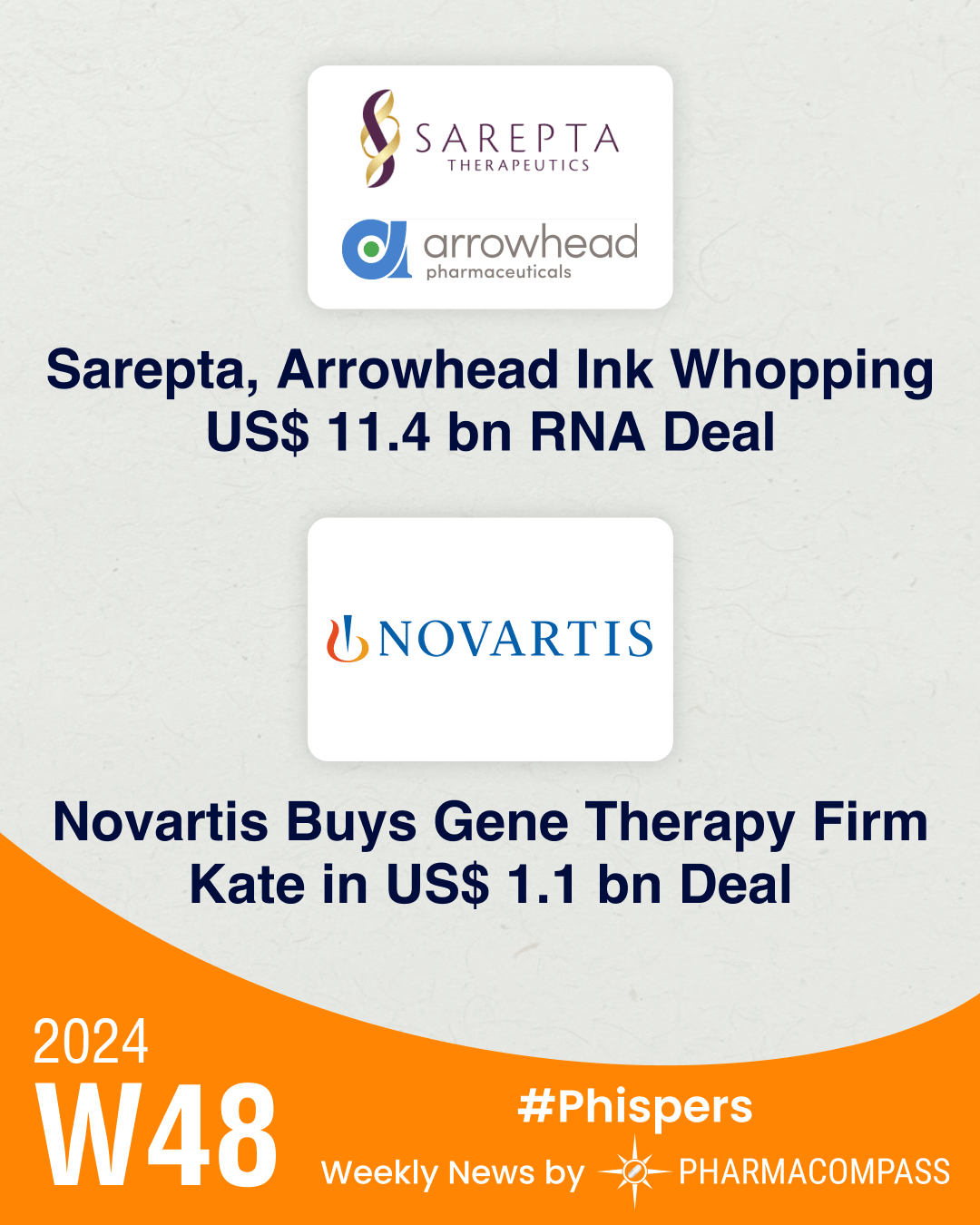
By PharmaCompass
2024-11-28
Impressions: 1,809 Article || 25 Video
The week saw three large deals signed in promising fields. First, Sarepta Therapeutics signed a US$ 11.4 billion deal with Arrowhead Pharmaceuticals, securing worldwide rights to seven RNA-based programs. Second, Novartis announced the acquisition of Kate Therapeutics for up to US$ 1.1 billion, focusing on addressing neuromuscular diseases like Duchenne muscular dystrophy (DMD). And Roche expanded its CAR-T treatment capabilities by acquiring Poseida Therapeutics for up to US$ 1.5 billion.
In drug approvals, the US Food and Drug Administration (FDA) approved BridgeBio’s Attruby. This is the first new treatment for transthyretin amyloid cardiomyopathy in over five years.
In news from clinical trials, Biohaven’s experimental drug taldefgrobep alfa that had failed a spinal muscular atrophy trial, showed promising results in body composition. The company is now exploring its potential as an obesity treatment.
Cassava Sciences faced a significant setback when its controversial Alzheimer’s drug simufilam failed to meet primary endpoints in a pivotal late-stage trial. The drug’s development was under scrutiny due to research fraud allegations against a neuroscientist linked to its research.
Sarepta’s US$ 11.4 bn mega-deal with Arrowhead promises ‘multiple potential blockbusters’
Sarepta Therapeutics has entered into a global licensing and collaboration agreement with Arrowhead Pharmaceuticals, which is valued at up to US$ 11.4 billion. This comprehensive deal includes an upfront payment of US$ 500 million and an equity investment of US$ 325 million. It grants Sarepta worldwide rights to seven RNA-based programs — four clinical and three preclinical.
Additionally, the agreement “affords multiple potential blockbuster opportunities” and encompasses milestone payments that could significantly increase the total value of the deal. The agreement also includes a discovery partnership targeting six more indications across skeletal muscle, cardiac, and central nervous system disorders.
Novartis bets US$ 1.1 bn on Kate Therapeutics for its neuromuscular pipeline
Novartis has acquired Kate Therapeutics for up to US$ 1.1 billion to address unmet needs in the treatment of neuromuscular diseases like DMD, facioscapulohumeral muscular dystrophy (FSHD) and myotonic dystrophy (DM1). While FSHD is a rare genetic muscle disease, DM1 is a serious condition that causes prolonged muscle contractions and weakness. And DMD is a condition that causes skeletal and heart muscle weakness.
This acquisition comes on the heels of late-stage setbacks faced this year by competitors in the muscular dystrophy arena. The Swiss drugmaker is learning from “the experiences of the first wave of companies that have had failures and perhaps some success with targeting these diseases,” said CEO Vas Narasimhan, adding that Kate has “really solved some of the challenges of delivering the right targets or the right genes for patients with FSHD and DM1.”
During a recent investor day, Narasimhan also indicated that Novartis plans to pursue additional acquisitions, particularly in the sub-US$ 5 billion range, as part of its ongoing strategy to invest in early-stage science.
Roche expands CAR-T treatment arsenal with US$ 1.5 bn acquisition of Poseida
Roche has announced the acquisition of Poseida Therapeutics for up to US$ 1.5 billion, including US$ 1 billion in upfront cash. By bringing Poseida’s promising technologies in-house, Roche aims to enhance its existing collaboration focused on developing cutting-edge CAR-T therapies for blood cancers.
San Diego, California-based Poseida is known for its pioneering non-viral technology platform that enables the creation of allogeneic, T stem cell memory (TSCM)-rich CAR-T therapies. Among Poseida’s promising candidates is P-BCMA-ALLO1, which has shown compelling interim clinical data in patients with multiple myeloma.
Meanwhile, Roche’s TIGIT candidate, tiragolumab, combined with its anti-PD-L1 drug Tecentriq, has failed to improve overall survival in a recent phase 3 trial for non-small cell lung cancer (NSCLC). This marks the second failure for tiragolumab in NSCLC trials. It has also not succeeded in a late-stage test for small cell lung cancer.
BridgeBio’s Attruby gains FDA nod for rare heart condition, to compete with Pfizer’s Vyndagel
FDA has approved BridgeBio’s drug Attruby (acoramidis), marking the first new treatment for transthyretin amyloid cardiomyopathy (ATTR-CM) in over five years. This oral medication is designed to stabilize transthyretin (TTR) proteins, which, when destabilized, can lead to the accumulation of amyloid deposits in the heart, severely impairing its function.
The approval is based on promising results from a late-stage study, which demonstrated that Attruby significantly reduces cardiovascular death and related hospitalizations, ultimately improving patients’ quality of life. This approval positions BridgeBio to compete directly with established players like Pfizer, whose blockbuster Vyndaqel (tafamidis meglumine) has dominated the market.
After research fraud probe, Cassava’s controversial Alzheimer’s drug fails late-stage trial
Once hailed as a potential breakthrough in Alzheimer’s treatment, Cassava Sciences’ simufilam has failed to meet primary endpoints in a pivotal late-stage trial. The experimental treatment has been at the center of scrutiny after a medical professor linked to its development was charged with fraud in June. Neuroscientist Hoau-Yan Wang allegedly submitted false data to secure millions of dollars in public funds for research into the drug, prompting investigations by the Securities and Exchange Commission (SEC) and the National Institutes of Health (NIH). Critics have questioned the validity of the preclinical and early clinical data, suggesting that the promising results may have been overstated or fabricated, and why the trial was allowed to proceed.
Biohaven’s failed drug shows promise as obesity treatment: Biohaven’s experimental drug, taldefgrobep alfa, failed to meet its primary endpoint for spinal muscular atrophy (SMA) – the world’s leading genetic cause of infant deaths. While the treatment did show some improvements in motor function, these results did not achieve statistical significance when compared to placebo and standard care. Interestingly, the trial revealed that taldefgrobep alfa had a positive impact on body composition, leading to a reduction in body fat and an increase in lean muscle mass and bone density. This unexpected outcome has prompted Biohaven to explore the drug’s potential as a treatment for obesity, with plans to initiate a phase 2 trial soon.
Amgen’s weight loss med: In a closely-watched, phase 2 study, Amgen’s experimental weight loss drug, MariTide (maridebart cafraglutide), demonstrated up to 20 percent weight loss after a year. Administered monthly or less frequently, it did not reach a weight loss plateau, suggesting the potential for further weight loss beyond 52 weeks. Despite these promising results, some investors remain cautious, as the weight loss is at the lower end of the 20 to 25 percent benchmark set by analysts.
The PharmaCompass Newsletter – Sign Up, Stay Ahead
Feedback, help us to improve. Click here
Image Credit : Phisper Infographic by PharmaCompass license under CC BY 2.0
“ The article is based on the information available in public and which the author believes to be true. The author is not disseminating any information, which the author believes or knows, is confidential or in conflict with the privacy of any person. The views expressed or information supplied through this article is mere opinion and observation of the author. The author does not intend to defame, insult or, cause loss or damage to anyone, in any manner, through this article.”








